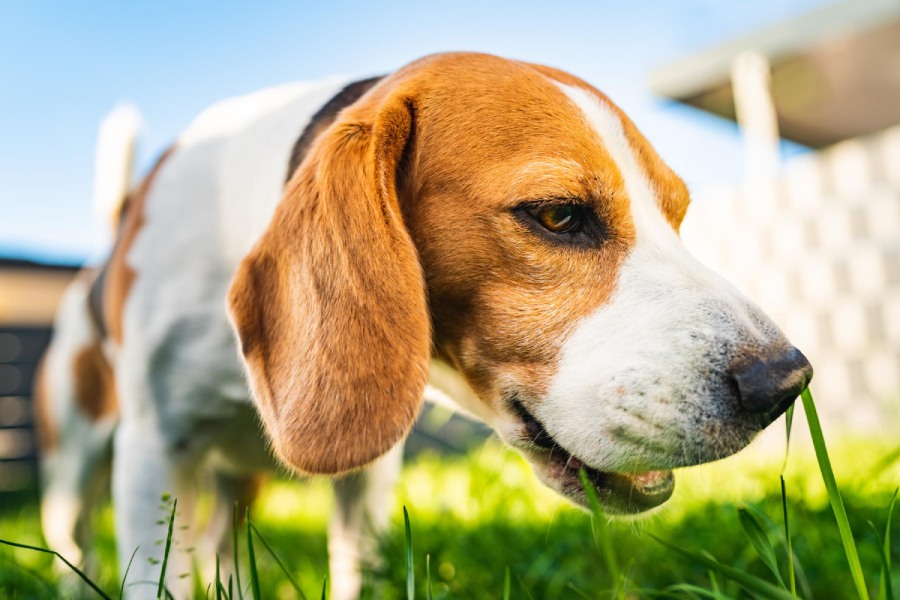A fun little game that my dog likes to do is run out into the yard and munch on some tasty blades of grass and then almost immediately throw it up. No matter the season or if she’s eaten a full meal already, she runs out, eats grass, and vomits. I thought it would stop once she realized the grass was coming back up every time, but she’s never learned. It’s really left me wondering, what the heck is going on?! I don’t want to pick up puke every day for the rest of my life. Well, let me share with you what I’ve found out.
Possible Reasons For Eating Grass
The first thing I learned about dogs and their strange obsession with consuming grass is that my pup is not alone! In fact, in one study 79% of the 49 dog owners said their dog had eaten plant matter at some point in time. It’s also in their DNA. Even today, wild dogs are known to occasionally eat grass. Veterinarians often link this with pica. Pica is a disorder where your dog eats things that aren’t food. This could include grass, fecal matter, or even your socks! The reason your dog might be suffering from pica could be boredom, a nutritional deficiency, or that they simply like the taste.
It’s not uncommon for dogs to end up vomiting after eating grass, but it doesn’t always happen. There’s some evidence to suggest that your pup turns to grass when they have an upset tummy, but that hasn’t been proven. Studies have been done and they show that less than 10% of dogs appear to be sick prior to consuming grass. Others believe that when blades of grass are eaten, they tickle the throat and stomach lining and that this sensation can result in your dog throwing up.
There are others out there who suggest that dogs eat grass to improve digestion, treat intestinal worms, or fulfill a nutritional need like for fiber. There’s an example of a poodle who ate grass and vomited every single day for a whole seven years. The owner then put the dog on a high fiber diet and he never ate grass again. It might be worth a try, but talk to your veterinarian about your dog’s grass eating habits and what food you’re currently feeding.
Should I Stop My Dog From Eating Grass?
Overall, I learned that it’s not bad to let your dog eat grass. If you’re concerned, you can try to get your dog some more exercise. Longer walks or extra fetch sessions are great ways to wear out your dog so that boredom isn’t as big of an issue. You could also consider putting your dog into dog daycare a few times a week to alleviate some of the boredom, especially if you work long hours and aren’t able to let him out during lunch.
It’s important to note that no, grass is not harmful, but do you know what is? Herbicides and pesticides. Be cautious of what you spray and where your dog is eating the grass. If you’re nervous that your pup was exposed, call your veterinarian and take their recommended next steps. You can also use the ASPCA’s Animal Poison Control Center website as a resource for toxic and non-toxic plants. You don’t want your dog eating grass and then accidentally ingesting a leaf or another part of a toxic plant.
Concerned About Your Dog Eating Grass? Talk With Your Vet!
As with anything to do with dogs, you should consult your veterinarian if you notice your dog is eating a ton of grass even with more exercise. There’s probably nothing wrong, but they can determine if there is an underlying issue that’s causing your dog to seek out grass as relief. It’s not something to go to an emergency vet for, but the next time you pop in for a booster or check up, you can and should discuss what’s going on and see what your vet thinks.
Book an appointment with your vet at Windy Hill Veterinary Hospital by calling (770) 333-9030 or using the online form today!

